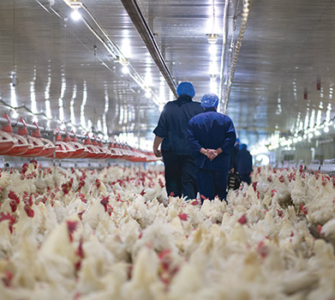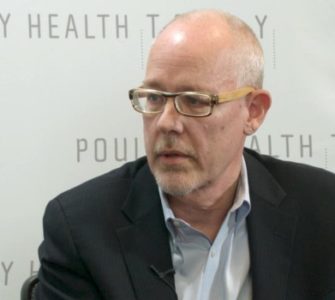Mountaire Farms is first company to carry the One Health Certified label
Mountaire Farms is the first animal protein company to carry the One Health Certified label, demonstrating its commitment to animal production standards established by the program.
Don Ritter, DVM, director of technical marketing for Mountaire Farms, said that to carry the One Health Certified label, his company had to be audited by USDA to verify its compliance with the program, which was officially launched in January 2020.
There are five pillars to the One Health Certified program: disease prevention, veterinary care, antibiotic use, animal welfare and environmental impact.
“It’s all a very tightly controlled system to take care of animals properly and responsibly. That’s the main goal of the program,” said Ritter, who played a key role in the development of One Health Certified.
The initial guidelines of One Health Certified were developed for chickens and turkeys. Pork will be next, then other animal commodity proteins will be added such as eggs, dairy and beef, he said.
One Health Certified is administered by the National Institute of Antimicrobial Resistance Research and Education, which is based at Iowa State University, led by veterinarians and intended to have a societal impact on antimicrobial resistance, Ritter noted.
Positive response
The response to One Health Certified has been positive from producers, food purveyors and retailers, and several large retail chains want the label on their products, he reported.
Producers interested in One Health Certified can see the standards required and learn how to become certified by the program on the program’s website onehealthcertified.org.
The core value of Mountaire Farms, which is headquartered in Millsboro, Delaware, is to take care of animals under its care, Ritter continued. Some of the more restrictive programs, such as no antibiotics ever (NAE), can sometimes put the health and welfare of chickens at risk, “and we consider it an unnecessary risk.” The One Health Certified program promotes responsible care practices that allow producers to take care of animals appropriately at all times, “even the ones that have health challenges.”
Documentation
Meeting the standards established under One Health Certified requires more veterinary oversight and documentation than some companies are used to providing, Ritter acknowledged. For example, when a flock has mortality that exceeds an established threshold, an investigation report is completed and a veterinary action plan must be filed within 24 hours of that investigation.
That means if farms have a health challenge on Friday, veterinarians are busy writing plans on Saturday. “You’ve got to have the veterinary staff to cover those needs,” he said.
The One Health Certified program also restricts the labels that companies can use on their products. NAE, non-GMO and all-vegetable diet labels cannot be used alongside the One Health Certified label because they can be confusing to consumers. “The goal of One Health Certified is to reduce consumer confusion and replace it with a logo that represents a balanced, comprehensive program,” Ritter said.
Customers, he noted, have been very excited and positive about the One Health Certified program. “We think it’s a very good value proposition for our customers, and our consumer research indicates that.”
Customer research
Initial research involving 1,000 customers indicates that when they are shown the five pillars of the program, 83% would choose the One Health Certified label and of that 83%, more than half would pay more for the product. “So consumers value the program,” Ritter said, and noted that of the five pillars, consumers valued veterinary care guidelines the most.
“You know, people want their animals cared for properly and responsibly. I think this program checks all the boxes and delivers on what most consumers value,” he said.
Currently, marketing and education plans for One Health Certified are under development. In the meantime, Mountaire has been meeting with customers to provide details about the program.
Ritter expects the One Health Certified program to give producers operating under more extreme production systems a place to transition to that will enable them to sell their products to a wider range of customers.
Looking ahead, Ritter believes the program could represent the majority of animal proteins produced in the US.
There will always be people who want the most expensive products they can find, and there will always be people who want the least expensive. But there’s a huge middle ground that will find One Health Certified appealing, he predicted.
Posted on June 4, 2020

















